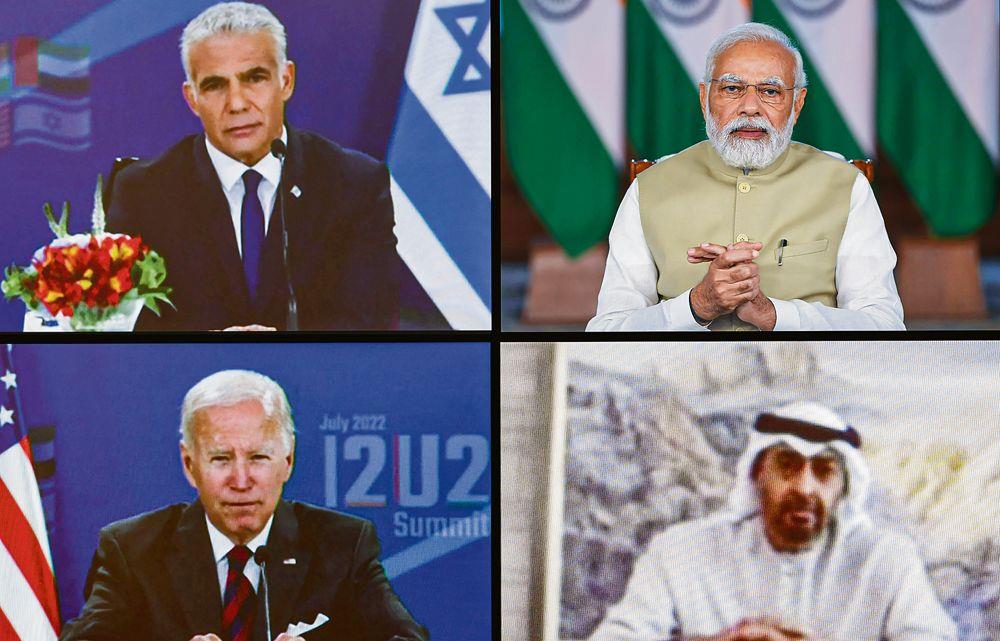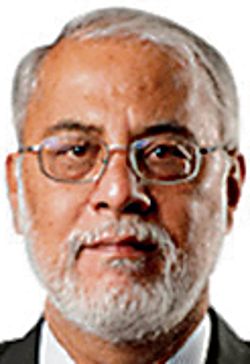
Heft: India is viewed as the key anchor that provides ballast for both groupings — Quad as well as I2U2. PTI
Distinguished Fellow, Observer Research Foundation
We need to be careful in evaluating the new India-Israel-US-UAE (I2U2) grouping. It could well end up as an alphabet soup of alignments and partnerships — BRICS, SCO, Quad, ARF, GCC, OPEC, RIC, APEC and so on — which wax and wane over the years. Some of them are good for a summit, a striking headline or two, others have dragged on as parts of the diplomatic ecosystem that have not really delivered anything.
How India will square the Iranian circle with its Abrahamic allies and the US is not clear. But New Delhi needs to think this one through carefully.
While there was a great deal of interest in Biden’s West Asia visit in the context of Israel, Palestine and Saudi Arabia, the I2U2 virtual meet last Thursday did not generate much interest, except in the Indian media. The joint statement issued after the meeting said the grouping intended ‘to mobilise private sector capital and expertise’ to modernise infrastructure, low carbon development, public health, access to vaccines, physical connectivity and promote the development of critical emerging and green technologies even while ensuring ‘near and long-term food and energy security’.
If that sounds like Quad, it is Quad, but the new one in the Middle East. But where the eastern Quad’s goal is to contain China, the western one hasn’t quite shaped up as an anti-Iran front.
East or west, India remains in sweet spot of sorts. New Delhi is viewed as the key anchor that provides ballast for both groupings. The I2U2 summit has led to a $2 billion UAE investment in India to develop integrated food parks aimed at reducing food waste and spoilage and water conservation. We will also get a $ 330 million project for a 300MW wind and solar energy project.
But the UAE, the US and Israel are not really looking at the grouping as their own development strategy, except perhaps in the area of climate change. So, the question is, what are they getting out of it?
The short answer is, their goals are political. The Middle East is the best example to show that for the US, neither human rights nor the ‘rules-based international order’ really matters. What does are its national interests, which are synonymous with maintenance of its global primacy. Having neglected the region for a while, its primary need is to push back against the growing Chinese influence. That is what made Biden reach out to Saudi Arabia, and it is this that which is compelling him to ignore his own framing of global issues as a struggle between democracies and autocracies.
Associated with this is the pushback against Iran, which not only has its own regional power ambitions, but also is increasingly seen as part of the Russia and China combine. As part of this, the US and Israel see the grouping as a means of strengthening the Abrahamic Accords with Sunni Arab states which could be moving towards creating a new Middle East Air Defence alliance to counter Teheran.
The problem is that US policy shifts goals at will and questions about its reliability stare us in the face. From Obama to Trump and Biden, the US has negotiated the nuclear deal with Iran and then walked out of it and has now been trying to get back in. It has also precipitously withdrawn from Afghanistan. In both instances, friendly regional states like India have been left holding the can. And, of course, Biden has just walked back on his Saudi Arabian policy.
Since the 1990s, India has followed a four-pronged policy in the region which has seen it maintain good bilateral ties with — Saudi Arabia, Iran, Israel and the US. Despite being close to the US in the Indo-Pacific, there is little coordination in the policies of the two countries in this vital region till now.
India has built up significant defence ties with Israel under the watchful eye of Uncle Sam. The Modi government has been particularly successful in strengthening ties not only with Israel, but also between India and the GCC countries, like Saudi Arabia and the UAE where there are nearly 6 million Indian workers.
But a crucial leg — ties with Iran — is limping. How India will square the Iranian circle with its Abrahamic allies and the US is not clear. But New Delhi needs to think this one through carefully.
Indian foreign policy has two elements — the oceanic and the Eurasian. The most common route to the west has been blockaded by Pakistan. Iran has emerged as an important element in India’s overland bypass strategy to Central Asia and Europe, which involves the ports of Chabahar and Bandar Abbas. Iran is the closest source of exportable hydrocarbons to the Indian subcontinent and its natural resources, and its population base offer a proximate market for Indian goods. Geography makes Iran the natural regional power in the Persian Gulf.
But a lot of this remains potential to be worked on. It has been impeded by the long-running American-led embargo on Iran on account of its nuclear weapons programme. India was Iran’s second-biggest oil buyer till the US forced us to end our imports in 2019 with plans for additional investment in its oil and gas sector.
For a rising India, stability and peace in the Middle East is crucial. Any disruption there will affect its diaspora and its energy security. But this goal does not align with two of its I2U2 partners whose policies are based checking Iran and China. In fact, they do not fit in with the goals of other regional leaders, like Saudi Arabia and the UAE, who have good ties with Beijing and are also trying to improve ties with Teheran.
Join Whatsapp Channel of The Tribune for latest updates.




























